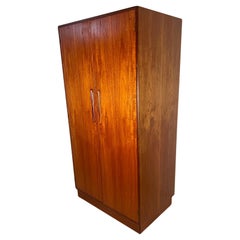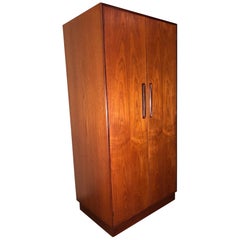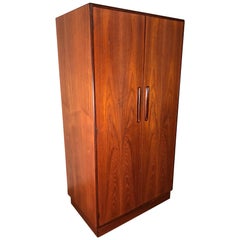G Plan Wardrobes Used
Mid-20th Century British Mid-Century Modern G Plan Wardrobes Used
Teak
Recent Sales
Mid-20th Century English Mid-Century Modern G Plan Wardrobes Used
Teak
Mid-20th Century English Mid-Century Modern G Plan Wardrobes Used
Teak
Mid-20th Century English G Plan Wardrobes Used
Teak
Mid-20th Century Great Britain (UK) Mid-Century Modern G Plan Wardrobes Used
Teak
Mid-20th Century English Mid-Century Modern G Plan Wardrobes Used
Teak
1960s English Mid-Century Modern G Plan Wardrobes Used
Elm
Mid-20th Century British Mid-Century Modern G Plan Wardrobes Used
Teak
Mid-20th Century British Mid-Century Modern G Plan Wardrobes Used
Teak
Mid-20th Century European Mid-Century Modern G Plan Wardrobes Used
Teak, Plywood
1960s English Mid-Century Modern G Plan Wardrobes Used
Elm
Mid-20th Century English Mid-Century Modern G Plan Wardrobes Used
Teak
Mid-20th Century English Mid-Century Modern G Plan Wardrobes Used
Teak
G Plan Wardrobes Used For Sale on 1stDibs
How Much is a G Plan Wardrobes Used?
A Close Look at mid-century-modern Furniture
Organically shaped, clean-lined and elegantly simple are three terms that well describe vintage mid-century modern furniture. The style, which emerged primarily in the years following World War II, is characterized by pieces that were conceived and made in an energetic, optimistic spirit by creators who believed that good design was an essential part of good living.
ORIGINS OF MID-CENTURY MODERN FURNITURE DESIGN
- Emerged during the mid-20th century
- Informed by European modernism, Bauhaus, International style, Scandinavian modernism and Frank Lloyd Wright’s architecture
- A heyday of innovation in postwar America
- Experimentation with new ideas, new materials and new forms flourished in Scandinavia, Italy, the former Czechoslovakia and elsewhere in Europe
CHARACTERISTICS OF MID-CENTURY MODERN FURNITURE DESIGN
- Simplicity, organic forms, clean lines
- A blend of neutral and bold Pop art colors
- Use of natural and man-made materials — alluring woods such as teak, rosewood and oak; steel, fiberglass and molded plywood
- Light-filled spaces with colorful upholstery
- Glass walls and an emphasis on the outdoors
- Promotion of functionality
MID-CENTURY MODERN FURNITURE DESIGNERS TO KNOW
- Charles and Ray Eames
- Eero Saarinen
- Milo Baughman
- Florence Knoll
- Harry Bertoia
- Isamu Noguchi
- George Nelson
- Danish modernists Hans Wegner and Arne Jacobsen, whose emphasis on natural materials and craftsmanship influenced American designers and vice versa
ICONIC MID-CENTURY MODERN FURNITURE DESIGNS
- Eames lounge chair
- Nelson daybed
- Florence Knoll sofa
- Egg chair
- Womb chair
- Noguchi coffee table
- Barcelona chair
VINTAGE MID-CENTURY MODERN FURNITURE ON 1STDIBS
The mid-century modern era saw leagues of postwar American architects and designers animated by new ideas and new technology. The lean, functionalist International-style architecture of Le Corbusier and Bauhaus eminences Ludwig Mies van der Rohe and Walter Gropius had been promoted in the United States during the 1930s by Philip Johnson and others. New building techniques, such as “post-and-beam” construction, allowed the International-style schemes to be realized on a small scale in open-plan houses with long walls of glass.
Materials developed for wartime use became available for domestic goods and were incorporated into mid-century modern furniture designs. Charles and Ray Eames and Eero Saarinen, who had experimented extensively with molded plywood, eagerly embraced fiberglass for pieces such as the La Chaise and the Womb chair, respectively.
Architect, writer and designer George Nelson created with his team shades for the Bubble lamp using a new translucent polymer skin and, as design director at Herman Miller, recruited the Eameses, Alexander Girard and others for projects at the legendary Michigan furniture manufacturer.
Harry Bertoia and Isamu Noguchi devised chairs and tables built of wire mesh and wire struts. Materials were repurposed too: The Danish-born designer Jens Risom created a line of chairs using surplus parachute straps for webbed seats and backrests.
The Risom lounge chair was among the first pieces of furniture commissioned and produced by legendary manufacturer Knoll, a chief influencer in the rise of modern design in the United States, thanks to the work of Florence Knoll, the pioneering architect and designer who made the firm a leader in its field. The seating that Knoll created for office spaces — as well as pieces designed by Florence initially for commercial clients — soon became desirable for the home.
As the demand for casual, uncluttered furnishings grew, more mid-century furniture designers caught the spirit.
Classically oriented creators such as Edward Wormley, house designer for Dunbar Inc., offered such pieces as the sinuous Listen to Me chaise; the British expatriate T.H. Robsjohn-Gibbings switched gears, creating items such as the tiered, biomorphic Mesa table. There were Young Turks such as Paul McCobb, who designed holistic groups of sleek, blond wood furniture, and Milo Baughman, who espoused a West Coast aesthetic in minimalist teak dining tables and lushly upholstered chairs and sofas with angular steel frames.
As the collection of vintage mid-century modern chairs, dressers, coffee tables and other furniture for the living room, dining room, bedroom and elsewhere on 1stDibs demonstrates, this period saw one of the most delightful and dramatic flowerings of creativity in design history.
Finding the Right wardrobes-armoires for You
When shopping for antique and vintage wardrobes and armoires for your home, there are several things to keep in mind, not least of which is question number 1:
What is the difference between an armoire and a wardrobe?
The difference between an armoire and a wardrobe is actually simple: An armoire is merely an ornate wardrobe. A wardrobe is a tall, streamlined storage cabinet that usually has some combination of drawers, shelves and hanging rods.
Antique and vintage armoires, on the other hand, are freestanding, heavy wooden structures that typically feature decorative metal hinges and pictorial carvings. Armoires are large cabinets that aren’t outfitted with the varied storage features that wardrobes now commonly have. Armoires often have one or two doors and a hanging bar and allow for quick access. Whether a minimalist mid-century modern wardrobe or grandiose Victorian-era armoire is the right fit for you, both are highly functional furnishings and can be a smart storage solution.
Armoires have been around since medieval times, and initially they may have housed weapons and armor. In their early days, armoires were often adorned with elaborate carvings and lavish paintings, particularly in Renaissance-era France. During the 18th century and later, armoires were widely known as “presses” for hanging clothes, and they were so large that they swallowed up the room where they stood.
In today’s modern homes, an antique armoire can be a striking, architectural work of art amid comparably unadorned furnishings. Whether you’re using your piece in the kitchen for cookware or as a food pantry, in the bedroom for clothes or in the living room as a media console, it will likely become a lovable focal point.
The evolution of the armoire can be seen in today’s corner wardrobes, which may rest on an asymmetrical base to account for corner placement, and even mirrored wardrobes, which feature a mirror affixed to the inside panel of one of the doors for convenience. Contemporary wardrobes commonly feature additional sliding trays and drawers and hanging space for clothing or linens, and the cabinet doors make them ideal for concealing televisions and computer monitors when such devices aren’t in use.
When choosing the right wardrobe or vintage armoire for your home, it’s good to have the following in mind: What are you planning to store in it? How much of what you’re storing will need to be housed in it? It should be big enough to accommodate your needs. What is the size of the room where your wardrobe or armoire will live? A large new piece of furniture in a modest space can easily become a hindrance if you have to navigate your way around it during your daily routine, so be mindful of the area you'll need in order to move freely.
Whether you are looking for an antique walnut armoire or a simple contemporary wardrobe, find the right piece for your home today on 1stDibs.


